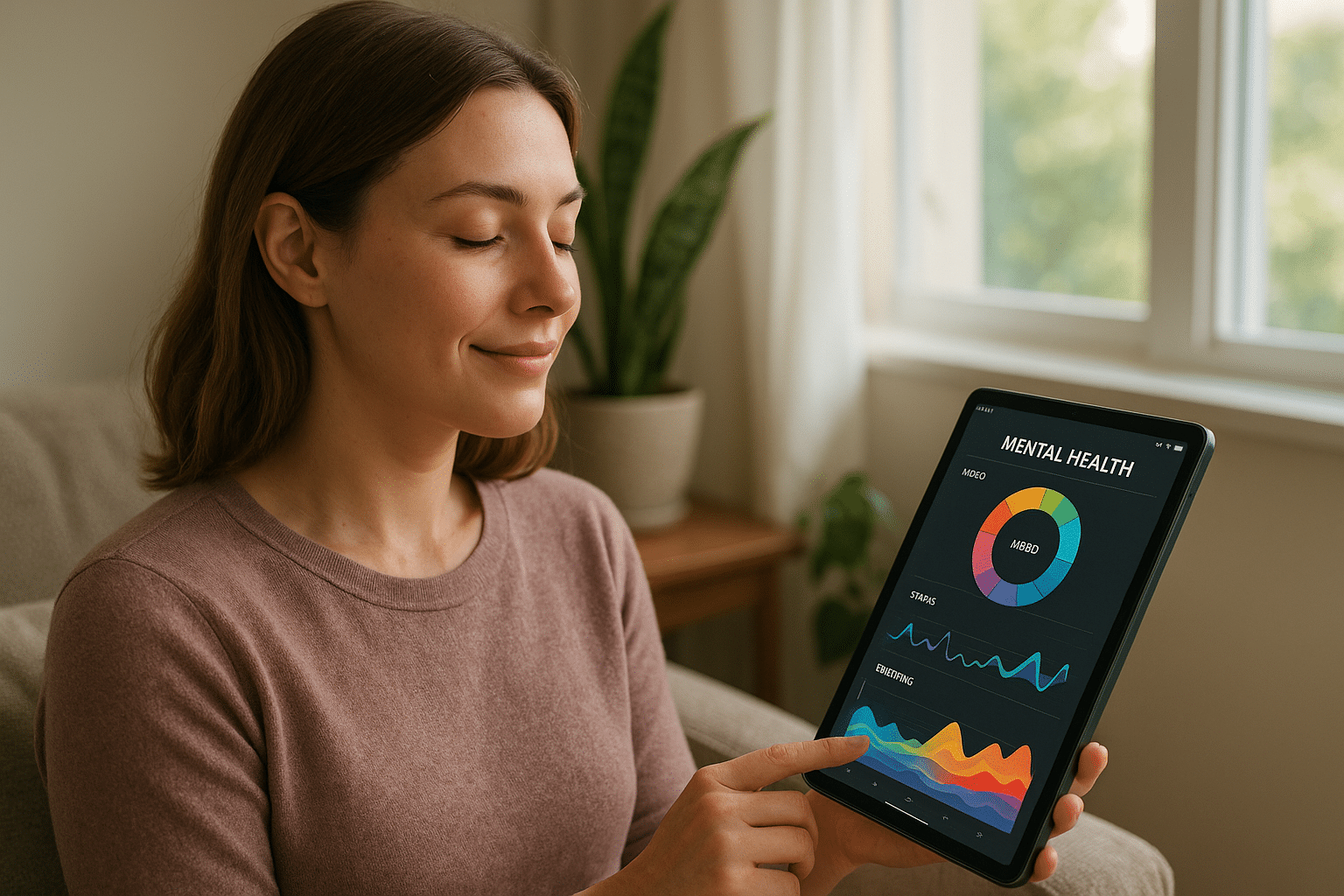Ads
Artificial intelligence is transforming the way we understand and approach mental health. 🌟 Innovative tools now make it possible to accurately identify emotions and offer personalized techniques, such as breathing exercises, to manage stress, anxiety, and improve emotional well-being. MindTech: AI Transforming Your Mental Health.
This breakthrough is revolutionizing not only how emotional problems are detected, but also how they are addressed quickly and effectively.
Ads
In this content, we'll explore how cutting-edge technology, known as "MindTech," combines intelligent algorithms and psychological studies to offer accessible and effective solutions. How does this technology work? What impact does it have on our daily lives? Is it truly reliable? These are just some of the questions we'll answer to unravel the potential AI has in mental health.
From apps that analyze your tone of voice to detect emotional changes to systems that guide you through breathing techniques based on your needs, the future of mental health is here. 🌐 Discover how these tools are designed not only to understand you better, but also to help you take control of your mental well-being like never before. MindTech: AI Transforming Your Mental Health.
Ads
See also
- Speak without borders
- Find what is not seen
- Apps that transform your creativity into a perfect manicure
- The best allies to listen to your world louder
- the app that rescues your memories
The power of AI to identify emotions in real time
How does AI understand your emotions? 🧠
Imagine if your phone or smartwatch could detect whether you're stressed, happy, or even anxious, all by analyzing your tone of voice, facial expressions, or heart rate. That's no longer science fiction. Thanks to advanced artificial intelligence (AI) algorithms, there are now tools that can interpret biometric data and behavioral patterns to identify human emotions with surprising accuracy.
These technologies work through machine learning models trained on vast databases of facial expressions, voice tones, and body rhythms. For example:
- Facial recognition: Algorithms that analyze microexpressions and muscle movements to determine emotional states.
- Voice analysis: Tools that detect changes in the tone, volume, and rhythm of your speech, associating them with specific emotions.
- Biometric data: Sensors in wearables that monitor your heart rate or blood oxygen levels to infer your emotional state.
The best part is that these tools don't require you to express how you feel. They can identify emotions even when we're not aware of them. This opens up a world of possibilities for taking care of our mental health in a more proactive and personalized way.
Practical applications for emotional well-being
So, how can these technologies improve your daily life? Imagine an app that sends you a notification to take a break because it detects your stress level is rising. Or a device that adapts your music based on your emotional state to help you relax or stay focused. These are just a few of the applications already being explored:
- Detect anxiety episodes in real time and suggest specific relaxation techniques.
- Personalize psychological therapies based on emotions detected throughout the day.
- Creating more empathetic environments in virtual communication, helping to improve human relationships.
Impressive, isn't it? 😲 But this is just the beginning. Let's continue exploring how AI is also transforming our relaxation tools.
Guided Breathing 2.0: When Technology Helps You Relax
The connection between breathing and technology 🌬️
We know that controlled breathing is one of the most effective ways to reduce stress and anxiety. But what if technology could take this practice to the next level? That's where AI-powered guided breathing tools come in.
These apps and devices not only guide you through breathing exercises, but also adapt the sessions in real time based on your emotional needs. For example, if you're particularly anxious, the system can detect your elevated heart rate and suggest a deeper, slower breathing exercise to calm you down.
Some interesting technologies in this area include:
- Portable devices: Like rings or bands that measure your physiological state and adjust breathing exercises in real time.
- Virtual Reality Applications: Immersive experiences that combine breathing techniques with relaxing landscapes, such as beaches or mountains.
- Voice assistants: They not only guide you through your breathing, but also provide feedback based on biometric data.
Thanks to these innovations, guided breathing is becoming a much more personalized and effective experience. Plus, these tools can be easily integrated into your daily routine, whether during work, before bed, or even in the middle of a busy day. MindTech: AI Transforming Your Mental Health.
Data-backed benefits
Research has shown that combining technology with breathing techniques has amazing results. Some benefits include:
- Faster stress reduction thanks to real-time feedback.
- Improves sleep quality, as the exercises are designed to relax both the body and mind.
- Greater emotional awareness, helping you identify patterns of stress and anxiety in your daily life.
Can you imagine being able to control your anxiety with just a few minutes of technology-assisted breathing? 🌟 It's a powerful tool that promises to change the way we approach our mental health.
The integration of MindTech into our daily lives
AI in your everyday gadgets
The incredible thing about these innovations is that you don't need futuristic devices to take advantage of them. Many of these tools are already available in the gadgets we use every day, such as smartphones, smartwatches, and voice assistants.
For example, there are apps that use your smartwatch's sensors to track your stress levels throughout the day and suggest times to do breathing exercises. Or artificial intelligence systems integrated into virtual assistants, like Alexa or Google Assistant, can provide you with reminders to take care of your mental health. MindTech: AI Transforming Your Mental Health.
Here are some examples of how you can integrate these technologies into your daily life:
- Integrated wellness programs: Apps that combine meditation, breathing, and emotion monitoring into a single platform.
- Custom Notifications: Reminders based on your behavior patterns, such as suggestions to take a break or exercise.
- Automated routines: Set your voice assistant to start a relaxation session every night before bed.
It's impressive how these technologies are making mental health care more accessible and efficient. But what about the future? Spoiler alert: we're just scratching the surface of what's possible.
Privacy and Ethics: Key Issues
Of course, we can't talk about artificial intelligence without touching on the topic of privacy. When we use tools that collect data as personal as our emotions or body rhythms, it's essential to ensure this information is handled ethically and securely.
Companies are investing in encryption and anonymization systems to protect our data, but as users, we must also be critical and mindful of the technologies we choose to use. Here are some tips to ensure you're on the right track:
- Always review the privacy policies of the applications you use.
- Prefer technologies from companies with a good reputation for data management.
- Set data collection limits on your devices whenever possible.
With these precautions, you can take advantage of everything MindTech has to offer without compromising your security. 🚀

MindTech: AI Transforming Your Mental Health
Conclusion
The AI-Powered Mental Health Revolution 🌟
In conclusion, the integration of artificial intelligence into mental healthcare has opened a new chapter full of possibilities. Advanced technologies, such as real-time emotion analysis and guided breathing tools, are transforming the way we approach emotional well-being.
From wearable devices that detect your mood to apps that personalize your relaxation exercises, these innovations are not only accessible but also profoundly effective.
Thanks to AI, it's now possible to identify emotions before they become overwhelming and act proactively. This not only improves our quality of life but also facilitates a more conscious relationship with our emotions and daily behavior patterns.
Furthermore, combining biometric data with traditional techniques, such as controlled breathing, is proving to be a powerful tool for reducing stress, improving sleep, and fostering self-awareness.
However, it is critical to ensure that these technologies are used ethically and safely. Privacy must be a priority, and users must make informed decisions when choosing the platforms they adopt. 🌐 With the right balance between innovation and responsibility, MindTech promises to be a transformative tool that will make mental health care more accessible, personalized, and effective than ever before.
Download Here:
- Woebot:
- Headspace :
